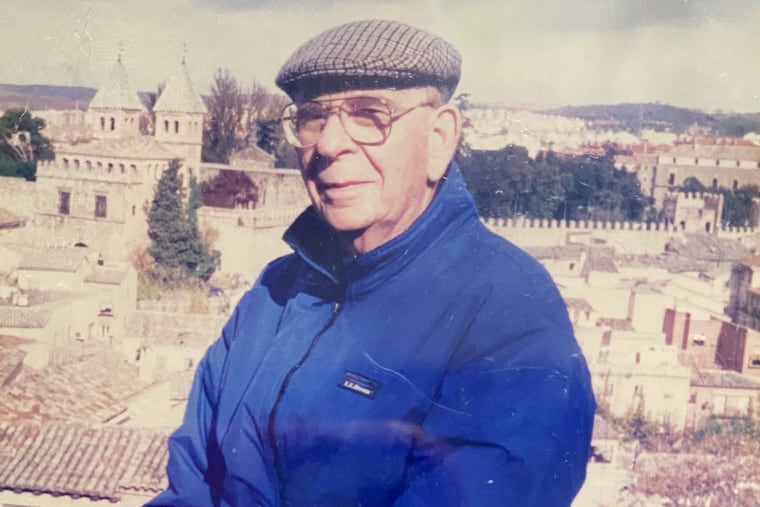Bob Greenberg, retired Inquirer assistant managing editor, has died at 93
He also worked as a reporter, night rewrite man, city editor, and features editor. “He was a rock of stability in an era of rapid change,” a former colleague said.

Bob Greenberg, 93, of Moorestown, retired reporter, editor, and assistant managing editor at The Inquirer, and Army veteran, died Sunday, April 7, at Masonic Village at Burlington of complications after a recent fall.
Mr. Greenberg joined The Inquirer in 1958 after working briefly at newspapers in Oklahoma and New York, and spent the next 37 years as a nightside reporter and city editor, features editor, and assistant managing editor for features. He worked for years in an all-male nightside newsroom he described in 2010 as a “raucous place” and later became an expert on comic strips as features editor.
He was a reporter and night rewrite man in the 1950s and ‘60s, city editor in the 1960s and ‘70s, features and entertainment editor in the 1970s and ‘80s, and assistant managing editor for features in the 1980s and ‘90s. He retired in 1995, and “had some wonderful years in retirement,” said his wife, Gail.
Determined to succeed in every position he held and often direct in his manner, Mr. Greenberg was part of a leadership group at The Inquirer in the 1970s that steered the paper through turbulent times. When ownership of the company changed and new editors were hired, Mr. Greenberg, said retired managing editor Gene Foreman, “was a rock of stability in an era of rapid change, and all of us benefited from his vast institutional memory.”
He was praised by former colleagues for supporting women in the newsroom, mentoring new staffers, and deftly organizing the paper’s annual submissions for the Pulitzer Prize. As features and entertainment editor in the 1970s and ‘80s, he routinely used detailed marketing and reader surveys to determine which comics to publish.
In 1981, after other newspapers dropped the Dick Tracy and Steve Canyon strips for what their editors said was too much “violence and terrorism,” Mr. Greenberg told the Associated Press: “We are concerned about violence in these and other strips. We have protested in the past over violent episodes, and we think we have had an influence in moderating the violence. We’ll continue to watch them closely.”
When The Inquirer dropped the Brenda Starr comic strip from its Sunday editions in 1985, Mr. Greenberg told former Inquirer columnist Clark DeLeon: “We feel that the strip has gone far, far downhill since the original artist retired. We don’t plan to drop the daily strip, but it’s hanging on by its toenails.”
He also served as a director for the Pennsylvania chapter of the Associated Press Managing Editors Association and, as president of the Newspaper Features Council from 1986 to 1988, advised other editors about which comics to publish. “He made some suggestions, and all of them were right on the mark,” Alan Shearer, then director of Eastern operations for the Los Angeles Times Syndicate, told Editor and Publisher magazine in 1992.
Mr. Greenberg’s interests were eclectic, and he enjoyed classical music and art as well as football and hiking. He read the sports pages and Smithsonian magazine, and former Inquirer colleague John Lubell said: “He was a Renaissance man.”
He told fascinating stories about a gunman who surrendered to him in the newsroom, a reporter so down on his luck he couldn’t afford to buy lunch, and many not-safe-for-work tales about life as a newspaper man. “He loved a great character,” said his son, Laurence. “His grandchildren retell and laugh about these stories often. I’m not sure he realized he was a great character, too.”
Robert Irwin Greenberg was born Aug. 26, 1930, in the Bronx, N.Y. He played basketball as a boy, hung around with friends in the neighborhood, and discovered that he loved to read and write.
He earned a bachelor’s degree at the University of Oklahoma and edited the sports section for the college newspaper. He served in the Army from 1953 to 1955 and worked briefly as a sports editor in Lawton, Okla., and reporter in White Plains, N.Y., before landing at The Inquirer.
He met Gail Fischer through mutual friends in 1956, and they married in 1958, and had son Laurence and daughter Tedi. They lived in Philadelphia and Mount Laurel before moving to Moorestown, and spent time for years at a second home in Maine.
Mr. Greenberg was an avid reader, and he daily devoured The Inquirer, New York Times, Washington Post, and local papers. He collected prints by American artists from the 1920s and ‘30s, left Phillies games early to beat the traffic, and wrote so illegibly his wife couldn’t read his signature. His family said he spoiled every pet he ever had.
“He was a quiet man, an observer with a wry sense of humor,” his wife said, “and he loved to tell stories.” His daughter said: “His gruff exterior, acerbic wit, and crazy antics always amused his audience. He was a leader and a role model, inspiring those around him to become the same.”
In addition to his wife and children, Mr. Greenberg is survived by four grandchildren and other relatives. Two brothers died earlier.
Services were held on April 10.
Donations in his name may be made to the Gaylord College of Journalism and Mass Communication at the University of Oklahoma, 395 W. Lindsey St., Suite 3000, Norman, Okla. 73019.